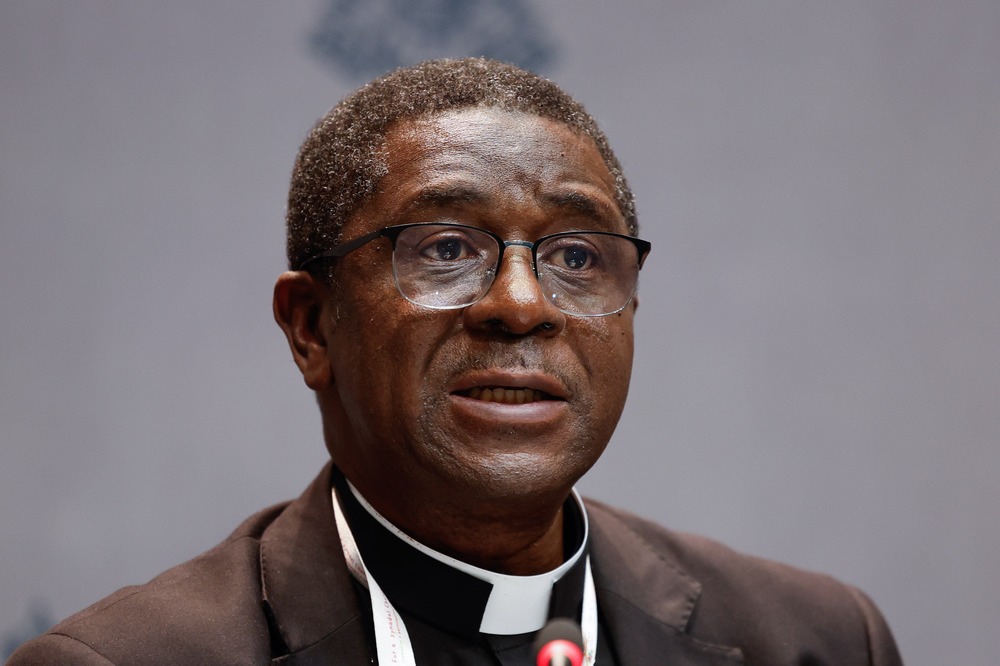
Archbishop Andrew Nkea Fuanya of Bamenda, Cameroon, speaks at a press briefing about the Synod of Bishops at the Vatican Oct. 22, 2024. (CNS/Lola Gomez)
Catholics in Asia and Africa have already been leading the way with synodality, two members of the Synod of Bishops on synodality said.
Archbishop Andrew Nkea Fuanya of Bamenda, Cameroon, told reporters at a Vatican briefing Oct. 22 that he hopes the more than 360 members of the synod return home "not just as passive recipients of synodality, but as active ambassadors" because synodality "is the way forward" for the church and society.
Father Clarence Davedassan of Malaysia told reporters, "This journey of synodality is not something that is new to many parts of Asia."
"Dialogue is not a novelty, dialogue is a necessity" in countries where there are people of many different cultures and religions living side by side, he said. "It is necessary to seek harmony" for people to live with each other and synodality is at the foundation of being able to do that.
"Interfaith and intercultural marriages are on the rise, and children born in these families learn how to listen to one another, learn how to respect one another, learn how to speak with one another in a very respectful way," which means "synodality is at the very base already," he said.
Fuanya said, "Synodality for us in Africa, especially for the community where I come from, is a total rejection of individualism. And it's a call for community living, walking together."
Faith life is based on small Christian communities that begin with the family and stay active on all levels of the church from mission stations to the parishes, dioceses, right up to the national, continental and universal level, he said.
"Africa is a special ground and a fertile ground for synodality," he said. "It helps us in peacekeeping because in these small Christian communities we resolve our matters."
Fuanya said he tells people synodality is how to fulfill what the prophet Isaiah foresaw when wrote that the lion and lamb would live together in peace.
"We are going through a moment of (a) boom of Catholicism. Our churches are full," he said. But the bishops' greatest concern is "how to keep our churches full for the future. And the only way that we can do this is through synodality."
"Synodality comes very alive in the small Christian communities because you don't live in anonymity as a Catholic," he said. "Everybody knows everybody within their small Christian communities and this is a very, very big treasure for Africa."
Advertisement
Catechists play a very important role on the African continent, he said. "This is what is making our churches for now still alive because at every level we have catechists for the small Christian communities, for the mission stations and for the parishes."
It is "a little bit strange" to hear people at the synod discuss the problem of finding ways for women to participate more fully in the life of the church, he said, "because our African women actually run our churches."
"More than 50% of our catechists who lead the small Christian communities and the mission stations are women," he added.
There are many mission stations, and some take hours to reach, which means it is "absolutely impossible" for a priest to be at each one every Sunday, Fuanya said.
The catechists prepare children and adults for the sacraments, preside over Sunday services and bury the dead, he said.
As for the sacraments, he said, "except in danger of death where they'll give baptism," the catechists do "whatever the law prescribes (and) they'll wait for the priest to come."
"But for the rest, the catechist is in charge of that community of Christians," he said.
Bishop Franz-Josef Overbeck of Essen said because of the lack of Catholic priests in Germany, he has strengthened the role of women in his diocese and the pastoral work they can do.
Women handle religious education and "preach," especially in parishes where a foreign priest does not speak the native German, he said.






